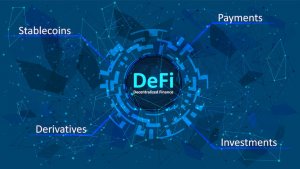Introduction
Decentralized finance or DeFi is a collective term given to a wide range of products and technologies that help manage the finances more innovatively without the interference of the central bank or any financial institution.
The decentralized applications that are generally are called DApps built on top blockchain like Ethereum and Bitcoin. The major highlight of DeFi is that they use smart contracts giving complete control over the finances. It helps in individual savings, payments, or investments, but it also facilitates better and efficient lending, margin trading, market predictions, etc.
With the help of DeFi tools, you can access the services that have any centralized authority. The significant idea behind launching DeFi is to make the entire process safer and more efficient than other traditional financial solutions. Though DeFi is efficient than other financial solutions, some roadblocks are preventing significant issues.
What Are The Major Problems Involved in Decentralized Finance?
Some of the major risks that revolve around DeFi are related to user errors, smart contracts, lack of insurance transparency, price mechanisms, etc. Irrespective of all the advantages DeFi holds, the initiative still remains an infant, making it vulnerable to risks.
Smart Contract Vulnerabilities
One of the significant issues that DeFi is going through is smart contract vulnerabilities. When a contract is released with a flawed code, it can result in fund losses. There have been instances where these particular issues with the smart contract have resulted in compromising blockchain.
User Error
The issue of smart contracts is also connected to an underlying problem of user error. Even if the code seems right, there can be some unexpected issues that can become a hindrance. Due to the user errors, millions of dollars have been lost in the name of DApps.
Internal Governance
Another crucial issue witnessed in DeFi is the internal governance and the external regulations of the assets. There are chances to control who can run and operate the platform. Along with that, the government can anytime issue regulations that can restrict the processes of DeFi.
Other Issues
Other common issues are related to the market unpredictability, lack of insurance, etc. that makes the individuals lose sums of money even if they haven’t made any mistake.
To realize the full potentials of DeFi, is essential to address the issue and find out how it can be managed. It is true that DeFi holds many advantages for the growth of the financial world. It depends on how well you utilize it by eliminating the issues.
The Future of DeFi
Addressing the current underlying issues of DeFi, there have been plenty of solutions that have emerged so far. For instance, Atomic Swaps and pTokens are likely to improve the DeFi and make it increasingly impressive for the finance industry.
The above mentioned were the major hindrances that are blocking the development of DeFi. Different types of solutions are being worked out to cater to the pain points of DeFi. With efficient use of bug bounties, audits, open-source commitments, etc., problems related to smart contracts and errors can become less frequent.





